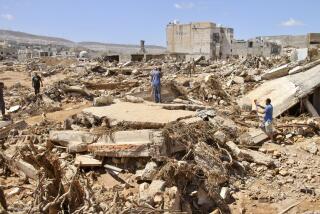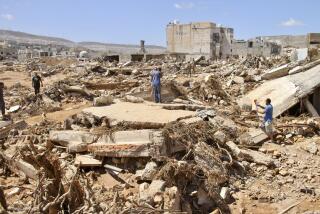For Chinese, Flooding Is Torrent of Trouble
WUHAN, China — Wang Zhanchen rushed in where younger men feared to tread water.
Alerted by cries of a hole in the dike along the swollen Yangtze River, Wang, 68, stripped off his clothes and jumped into the waterway, pushing away the debris that clawed at his bare body. With his feet, the army veteran felt for the breach in the levee, then stood sentinel in chin-high water until onlookers plugged the gap with sandbags and even family quilts.
“It was dangerous, but I didn’t think about life and death,” Wang said afterward. “All I thought about was stopping up the hole.”
His heroics last week averted a potential disaster as the river rose to a near-record height of 96 feet in Wuhan, an industrial city of 7 million people in Hubei province.
Other areas have not been so lucky.
After weeks of rain of biblical proportions, the Yangtze, China’s longest river, has inundated huge swaths of central and eastern China, killing more than 1,200 people, leaving millions more homeless and doing almost $5 billion in damage so far.
Although floods are an annual scourge here, officials say this season’s deluge has triggered the worst flooding since 1954, when 30,000 died amid torrential storms.
About 60% of Hunan province, the birthplace of Mao Tse-tung, sits underwater. The provinces of Anhui and Jiangsu have declared states of emergency. Work on the massive Three Gorges Dam, which is supposed to prevent floods such as these when it is completed, ground to a virtual standstill during the height of the storms.
*
The central government has mobilized millions of soldiers and citizens on a round-the-clock campaign to shore up China’s extensive network of concrete and earthen dikes, which teeter on the verge of collapse in hundreds of spots because of saturation and shoddy maintenance.
And still the rain continues to fall on the middle and lower reaches of the Yangtze and its tributaries, adding to the possibility that yet another peak of rushing water--the region’s fourth--may hurtle downriver and wreak more destruction. Typhoons predicted for later this month could be catastrophic.
Even Shanghai, where the Yangtze finally spills into the East China Sea, has been warned to brace itself.
“We must make a do-or-die effort” to protect the levees, Wuhan Mayor Wang Shouhai told the local Changjiang Daily in its Saturday edition.
This bustling metropolis, one of China’s so-called “four ovens” for its soaring summer heat, was barely spared major damage when three previous crests of flood water roared by in the past two weeks.
Government leaders were so alarmed about the safety of Wuhan and other densely populated industrial and farming centers that they weighed the possibility of blowing up some dikes to divert the flow, an option shelved for now.
The impact of weeks of rain was dramatically compounded July 21, when Wuhan was pounded by a storm for more than 10 hours straight.
As of Saturday, the level of the Yangtze had hovered at a dangerously high 95 feet for more than two days, directly threatening a railway line, small factories and slums in the embankments’ shadow.
“I never thought it would rain so hard,” declared Ying Hong, 25, a tire-repair factory worker who lives with his wife and son in a grimy one-room shack at the foot of the dike.
“Every night we go check the water level and ask them if it’s risen,” said Ying, jerking his head toward the soldiers stationed atop the levees to monitor their integrity.
About 140 miles of stone and mud dikes stretch across Hubei province, with 3 feet of sandbags crowning them in some sections. Flood-control experts have identified more than 1,000 weak spots in the dikes, state-run media reported.
*
On the Hubei-Hunan border, workers are frantically trying to contain Dongting Lake, an overflow basin for the Yangtze that has risen to a perilous record level of 106 feet.
The area already is heavily flooded, but a further break in the levees could send tons of water cascading down on more villages, wiping them out like a muddy brown eraser.
About 900,000 residents have been displaced, some of them taking refuge on the levees themselves.
“People are living on the dikes. They have salvaged as much of their own possessions as they can, and there are makeshift shelters made out of plastic sheeting,” said Alyson Froud, a nurse with the humanitarian group Doctors Without Borders.
“The local government is moving people as quickly as they can from the banks,” said Froud, speaking by telephone Saturday from Changsha, the Hunanese capital. “They’re as aware as we are that the sanitary conditions are far from perfect in terms of latrines, water to drink, water to wash in.”
Domestic and international relief organizations warn of potential epidemics of cholera, malaria, typhoid and other diseases, although no outbreaks have been reported.
Each county in northeastern Hunan has set up an anti-epidemic station. Froud’s group, in conjunction with the Red Cross, is passing out both Western and traditional Chinese medicines to treat diarrhea and skin ailments.
Here in Wuhan, 44-year-old Zhao Chunhua complained of an infected foot caused by constantly standing in the water that swamped the tiny brick dwellings where her family and a dozen other households live on the north side of the city. During the flood’s peak, one neighbor borrowed a boat every night to paddle from dry land back to her waterlogged home, where she slept on a bed raised nearly 5 feet off the ground but just inches above the waterline.
The flooding receded from these homes two days ago, but water remains outside their back doors, submerging gardens and fields.
Children wade around aimlessly. Chicken tracks furrow the goopy mud around the squat red buildings as strips of fish laid out to dry in the sun salt the air with their stench.
Zhao is stoic about her hurting foot, reserving her anger instead for the local leaders whom she and other residents accuse of total inaction to protect the people in their charge.
“Not one official cares,” she fumed. “I just wish they’d drain them water. I don’t ask for anything more.” Such complaints are frequent.
Downriver in the city of Jiujiang, in hard-hit Jiangxi province, five Communist Party officials were disciplined for dereliction of duty when authorities discovered that the officials had assigned no one to oversee the dikes. In Enping, a city in Guangdong province, a municipal official was dismissed after he fled the area just as flood-control efforts were at their most desperate.
“They don’t care about us average folk. Officials only care about their own pockets,” said Shi Yinxiang, 28.
Still, the government has mobilized as many as 4 million soldiers and citizens to fight the floods and aid the stricken areas. More than 100,000 medical personnel have been dispatched to help stave off disease. State-run press reported that the air force evacuated 300,000 residents as of earlier this week.
“People are working very hard. We are very impressed with what people are doing,” Froud said. “As far as I’m concerned, they know exactly what they’re about.”
The long-term effects will be the most difficult to deal with, as flood victims, especially farmers, look for permanent shelter and assess the heavy losses to their livelihoods.
*
In Hubei, Hunan and Jiangxi, 37 million people and about 6.6 million acres of farmland have been affected by the flooding, according to the Ministry of Civil Affairs. Thousands of factories have shut down or are producing below capacity. The central government has set aside $21 million for relief work in those provinces.
Urban merchants too are feeling the pinch.
At the Hua Hui Decoration Construction Co. in downtown Wuhan, the sales staff slashed 30% off the price of refrigerators that stood in 2 feet of water after the torrential rains of July 21. Waves shattered two of the four glass doors as waterlogged vehicles tried to plow through the streets that day.
“The cars were like boats,” said salesman Hu Bing, 30.
Most of the water has receded from the city center. But Wuhan’s airport expressway remains washed out. In lower-lying spots, only the tops of trees poke through the surface.
After a few days of cloudy but dry weather, forecasters are predicting possible thunderstorms today, leaving people like Wei Douming, 28, worried--but helpless.
“I don’t have enough money to build a new house” on higher ground, said Wei, whose home is finally dry enough to inhabit again. “I have nowhere to go.”
More to Read
Sign up for Essential California
The most important California stories and recommendations in your inbox every morning.
You may occasionally receive promotional content from the Los Angeles Times.











